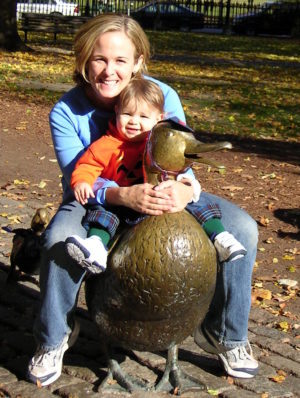A Part of Our Lives

Boston, 10.31.2004. The day after the Red Sox’s parade through Boston, celebrating the end of the “curse.” Mrs. Mallard is wearing a Red Sox hat and I’m inserting both into the life of the next generation.
Boston felt like home.
I was in high school when I stepped into Bean Town for the first time, but I already knew Charles St. because I’d traveled it with Robert McCloskey’s Mr. and Mrs. Mallard, and I knew the North Church and Charlestown Shore, because I’d rowed and ridden with Longfellow’s Revere.
I knew the city from childhood picture books and history textbooks, books that had been my friends and mentors, offering comfort and instruction.
They were a part of my life just as much as any living, breathing teacher or relative. They were a part of me.
I headed outside the city to walk with Thoreau and swim in Walden Pond, and daydream about conversations with Emerson, all of which had already run on repeat in my head.
The year I moved into an apartment on The Fenway wasn’t really a first either. Walking home at night, in the light of Fenway Park, always felt just like a bright summer day. Baseball always feels like summer, no matter the time of year or time of day—and I’d been hearing about Ted William’s Red Sox, and the curse of Babe for decades. Dad was a Red Sox fan and I grew into a baseball romantic, fed on the tales of the old players. I still can’t tell you the stats of every team or player, but the first time I went to Spring Training in Florida, tears pooled in my eyes. I’m not a rabid fan. I don’t watch all the games and I’m often out of date on rosters, but baseball is in me. I can’t imagine a world without it.
All of this came to mind this week as I settled into Stephen King’s Dark Tower series. My son and I are reading it together and I’m already behind. In the introduction to The Gunslinger, Stephen talks about being nineteen, how the idea for the series came to him, the development, and the gap between books. In this last bit, he shared stories of an “82-yr-old Gramma” and a death-row convict writing him, both wanting to know the ending before they died. How’d it all turn out? The convict promised to “take the secret to the grave with him,” which gave Stephen “the creeps.” Same here. Feels a little too close to a real life Misery. But, he got in their head just the same—and not all us fans are convicts or gramma’s with guilt letters.
When I think about childhood friends, I often think about King’s The Body, and Stand By Me, the movie that followed, because of the time in my life when I read and saw them. The Body was my first Stephen King story (Buy the book Different Seasons and you’ll receive the gifts of both The Body and Rita Hayworth and the Shawshank Redemption) and Stand By Me hit when I was the same age as the characters in the film. They’ve stayed with me.
This past week I read an interview with Bob Newhart, too. One of my godmother’s friends looked like Carol Kester, and for years I thought she was Bob’s receptionist, so I paid attention to Bob and his doings. That grew into an appreciation of him as I left childhood. In the interview, there’s a clip of him doing his routine about Abe Lincoln developing his personal brand with his publicist. A classic. At the very end of the interview, there’s this one last question and answer from the interviewer and Bob:
You were my late father’s absolute favorite. Newhart was his favorite show and we’d watch it together every week. But he never learned the name of it. He always called it “Vermont” for some reason.
But you watched. That’s the main thing. The thing about television is that you become part of people’s lives. People will come up to you on an airplane and tell you, “Thank you for all the laughs.” They look back on it fondly as one of the great times of their lives. Boy, when you’re part of peoples’ lives like that, it’s very special. It’s a very special thing.
It IS a special thing—but not just for television. Creators have the power to enter and influence lives, and to create memories. Those memories might be from a book or a team or a city. They might be from a commercial that makes us cry, or a song that transports us back 30 years to a sun-soaked day on Walden Pond.
So when you think about creating yourself (whether it is a book or a marketing campaign for a book or business, or whatever your thing is), think about what you’ve let into your own life. What has meant something to you? What would you want in your own life? Tolkien entered Stephen’s life and Dark Towers was born. What will inspire you? What will you allow in your life? And what will you create in its footsteps?



